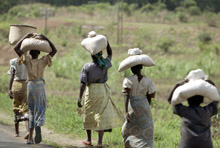
Typical street scene in Santa Ana, El Salvador. (Photo: iStock)
IMF Survey: Crisis Puts Millennium Development Goals Further at Risk
April 29, 2010
- Due to global crisis, 53 million more people will fall into extreme poverty
- Developing countries recovering from crisis thanks to strong policies
- Still possible to meet goal of halving poverty in developing world
The global economic crisis will take a serious long-term toll on development and has hampered progress toward all eight Millennium Development Goals.

Global recession, food and fuel crisis to have a lasting, negative impact on critical human development indicators (photo: Frank May/dpa)
GLOBAL MONITORING REPORT
But cutting extreme poverty in half in developing countries—the number one Millennium Development Goal (MDG)—can still be achieved by the target date of 2015, predicts a new IMF–World Bank report.
Gender parity in primary and secondary education is also likely to be achieved by 2015. But the crisis is having an impact in several key areas of the MDGs, including those related to hunger, child and maternal health, and disease control, says the Global Monitoring Report 2010: The MDGs after the Crisis (GMR).
The GMR finds the global recession combined with the 2008 food and fuel crisis to have a lasting, negative impact on critical human development indicators. Fifty-three million more people, mostly from sub-Saharan Africa, will have to live on less than $1.25 a day in 2015 because of the crisis.
Better than feared
The impact, “while sizable and regrettable, is less than feared,” according to Murilo Portugal, IMF Deputy Managing Director. The GMR says the economic and social impact of the downturn would have been far worse if not for the effective—and often extraordinary—policy responses adopted by many countries, as well as the swift and sizable assistance provided by international financial institutions and multilateral development banks.
The mixed results argue for redoubling efforts toward achieving the MDGs. “To mitigate the damaging effects of the crisis,” says the report, “we must ensure inclusive and sustainable global growth, maintain and expand an open international trade and financial system, deliver on aid commitments, and encourage the private sector.”
The IMF and the World Bank stepped up to the human challenges posed by the crisis, upgrading their support for low-income countries over the past year via additional resources and more flexible lending. “These reforms underline our commitment to helping developing countries tackle the challenges of poverty reduction,” said Portugal.
While assistance from developed countries rose 0.7 percent in real terms last year to over $119 billion, this was short of commitments made. If the developing world is to build upon its success in fending off the crisis, its partners in the global economy must keep their promises.
And developing countries have to match external support with continued domestic reforms to make government spending and service delivery more efficient, the report concludes. Justin Yifu Lin, World Bank chief economist, encouraged developing countries to “improve their financial sector efficiency to reduce the cost of capital, sustain growth, and stimulate job creation. They also need to strengthen their social safety nets to help the most vulnerable groups of people.”
Growth recovering
Despite the setbacks from the crisis, there is good news in the GMR. The global economy is expected to rebound, with growth of more than 4 percent projected for this year. Emerging and developing countries are recovering from the crisis: their GDP growth is projected to accelerate to 6 ½ percent in 2010, up from 2 ½ percent in 2009, according to new IMF projections in the report.
The GMR projects that the turnaround in low-income countries will be faster than in previous crises, when these countries tended to recover slowly. This time, the shock originated in the advanced economies, and this, combined with the strong policies that many low-income countries had in place when the crisis hit, is allowing developing countries to pull through more quickly.
But the recovery is fragile. “Even in countries that have come through the crisis relatively unscathed, damage has been done. Here I am talking not about macroeconomic trends. Rather, I am talking about the lives of people who struggle each day to feed and clothe their families, and to educate their children,” Portugal emphasized. For these people, the crisis is not over.







